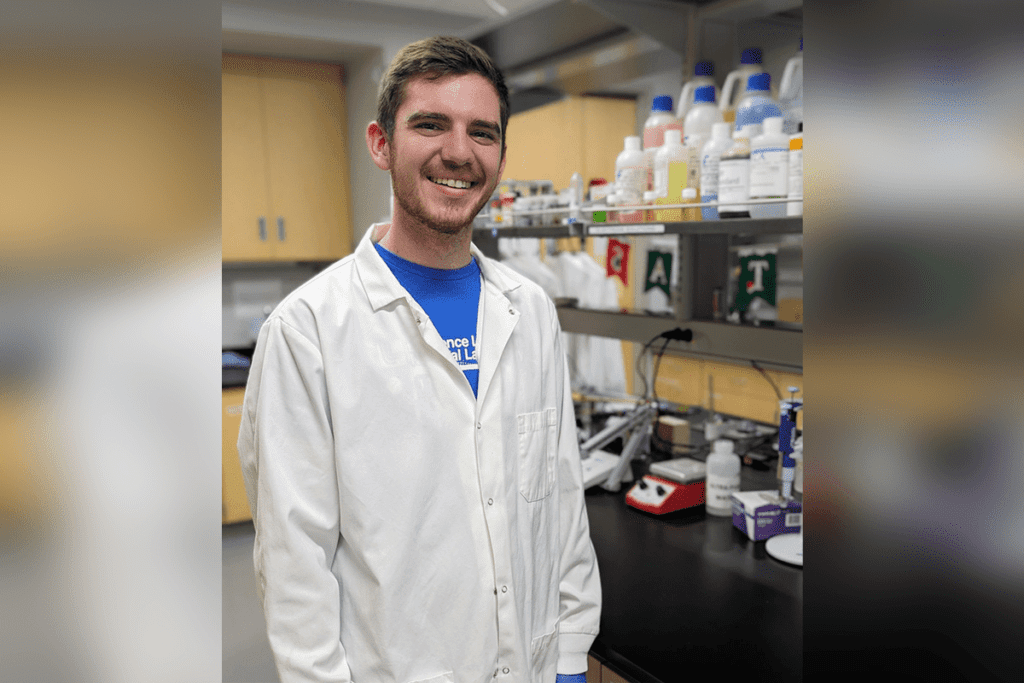UCF Doctoral Student Awarded National Nuclear Security Administration Program Award for Technical and Higher-Education
PhD chemistry student, Zachary Murphy, has been recognized for his research at the Lawrence Livermore National Laboratory.
By: Emily Dougherty | December 12, 2024

Photo from: Zachary Murphy
Zachary Murphy, a doctoral chemistry student in the College of Sciences, has been awarded the National Nuclear Security Administration Program Award for Technical and Higher-Education (PATH) for his research focusing on nuclear waste management during his internship at the Lawrence Livermore National Laboratory (LLNL).
The PATH Scholarship is sponsored by the National Nuclear Security Administration (NNSA) to STEM students at Minority Serving Institutions whose research can contribute to the Nuclear Security Enterprise (NSE).
Comparing his doctoral research to his work at LLNL, Murphy says that he viewed nuclear waste management from a different point of view, helping him to gain more insight into practices used for this kind of research.
“Both my PhD research and my LLNL research look at nuclear waste management, just from different perspectives,” Murphy says. “My internship at LLNL really helped enhance analytical skills that I’ve been able to help apply during my PhD work. It also inspired me to look into analytical techniques and instrumentation that I hadn’t originally considered utilizing in my own research but ended up being helpful.”
While completing his internship at LLNL, Murphy shared that he worked at the Glenn T. Seaborg Institute with scientist Gauthier Deblonde. There, he says he researched the appropriate depths to build nuclear waste repositories, the location where nuclear waste is stored for long-term disposal.
“We were looking into samples of rock that had been drilled out of a possible future nuclear waste repository location in order to provide insight on if a certain depth might be preferred to build the repository,” Murphy says. “Some minerals in soil are better at holding on to radionuclides, so in a repository, we want to choose a location where ‘better’ minerals are present that can hold on to the radionuclides if the tanks degrade and release any waste due to aging,” Murphy says.
He says he applied the skills he learned during his internship to his work here at UCF to further expand his insight on how minerals are affected by organic molecules and waste.
“My thesis work looks at a few different uranium minerals relevant to the nuclear fuel cycle,” Murphy explains. “My primary project so far looks at studtite (a uranyl peroxide mineral known to form in nuclear waste), and how its stability is affected by other organic molecules present in the environment or the waste itself. This work helps understand the various types of uranium present in nuclear waste, which can aid in the understanding of radionuclide migration in the environment due to tank aging and degradation.”
Murphy says he is also conducting research for his thesis to learn how studtite and other uranium minerals are affected by the introduction of chemicals to nuclear waste management.
“The goal of this project is to understand how certain chemicals will be trapped in the uranium mineral structure. In terms of forensic purposes, we want to see if we can utilize these extra chemicals as an intentional taggant to act as a sort of ‘barcode’ that can connect seized illicit material to its source,” Murphy says.
Murphy shared his gratitude for the knowledge and support that the PATH Scholarship has brought him, along with the journey it has helped provide to set up his future career.
“I am extremely grateful for the PATH scholarship; more than just the financial benefit, the scholarship provides an invaluable connection to the NNSA,” Murphy says. “As part of the scholarship, we have learned more about the mission directorates and available careers at the NNSA and NSE, while also providing a point of contact that can point us in the right direction to pursue these careers.”
Appreciative of the mentorship he has had along the way from UCF and the LLNL, Murphy shared how far it has taken him with his research.
“I truly can’t emphasize enough the mentorship and support that both Dr. Vasileios Anagnostopoulos, Associate Professor of Chemistry, and Dr. Deblonde have given along the way. I wouldn’t be where I am today without them,” Murphy says.
